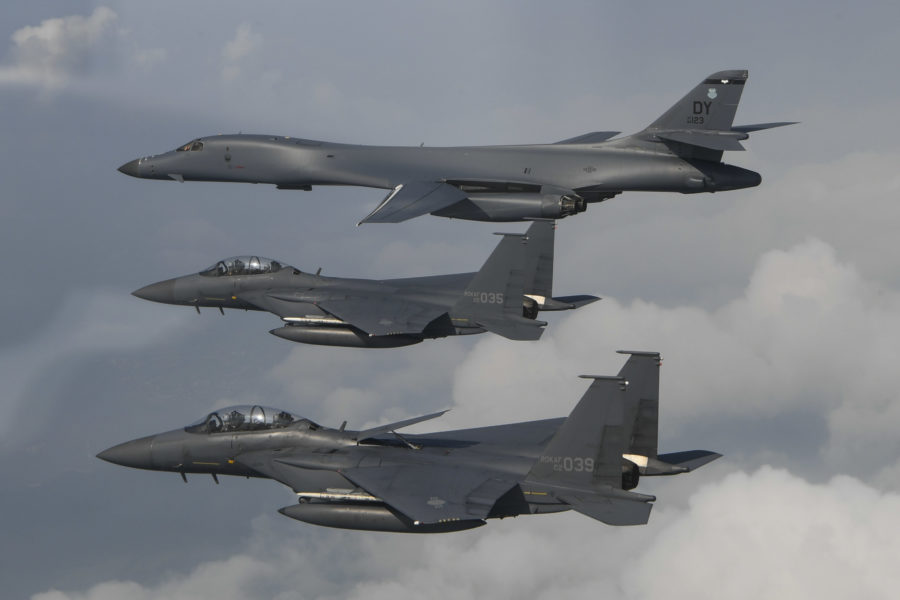Policy experts emphasized the importance of cooperation, especially in smaller-scale and newer defense areas, as key to the future of the U.S.-Japan-South Korea trilateral relationship at the release of an Atlantic Council issue brief Dec. 20.
“The historically fraught relationship between South Korea and Japan has presented obstacles to consistent and productive cooperation,” said Markus Garlauskas, nonresident senior fellow at the Atlantic Council and moderator of a discussion among the report’s authors and contributors. “In light of the new era of strategic competition that we’re seeing, and in an increasingly turbulent geopolitical landscape, along with recent turnovers in leadership, the three countries have demonstrated renewed interest in trilateral cooperation.”
Lauren Gilbert, associate director of the Indo-Pacific Security Initiative at the Scowcroft Center for Strategy and Security at the Atlantic Council and lead author of the brief’s “security and defense” chapter, said the authors wanted to go beyond common discussion areas and focus on three challenges, starting with how leadership transitions impact trilateral cooperation among the United States, Japan, and South Korea.
“We see progress under one leader, and then another leader comes in, and we lose that progress because of a lack of institutionalization,” Gilbert said.
The three countries also perceive threats differently. “Those diverging perceptions among who is the largest threat, who is the not-as-immediate threat … causes issues when you’re trying to create a unified policy,” she added.
The issue brief highlighted specific examples of this, noting that the U.S. and Japan are usually concerned by both North Korea and China, “whereas [South Korea] has traditionally been more concerned about North Korea and has attempted to maintain a more balanced relationship with China.”
In addition, Gilbert said, China’s threats of economic retaliation can promote hesitation as the trilateral partners approach future security and defense strategies.
But despite such challenges, she said the countries have shown “signs of willingness to cooperate through high-level summits between the countries’ leaders.” As such, the authors offered several recommendations for better defense cooperation.
“We have these concerns about either China or about domestic political concerns, so instead of focusing on highly sensitive areas of cooperation, such as large-scale military exercises, the country should opt for security cooperation in newer areas or less-sensitive areas,” Gilbert said. “So we’re talking crisis contingency planning, combating illegal fishing, and … maritime incursions.”
She said they also want to focus on “new frontiers” to enhance cooperation on cyber threats, as well as technology transfers.
“Rather than developing solely a framework for collective defense against coercive economic measures, such as supply chain attacks, [countries should] employ a proactive economic stance, such as forming novel trade agreements with regional partners in collaborating to enforce sanctions, when necessary,” Gilbert said.
Sanghyun Han, author of the brief’s science and technology chapter and a Ph.D. student at Georgia Tech, also noted several recommendations on how the three countries could cooperate.
Among his recommendations are creating private-public partnerships and encouraging participation in working-level meetings to promote action.
“I would argue there has been sufficient discussion by higher or senior-level officials, such as the launching of ministerial-level supply chain and commercial dialog and economic security dialogue,” Han said. “This is time for implementation rather than just … echoing the voices.”
He also wanted to raise public awareness on the importance of trilateral cooperation.
“Given the kind of embryonic stage of norms that [exist in] international institutions, or especially emerging technologies, trilateral cooperation needs to be pursued by establishing norms based on shared values and principles, such as democratic values,” Han said.
Kyoko Imai, who spearheaded the report’s global public goods section, said that area may be most promising for cooperation.
Looking at public health issues, the COVID-19 pandemic was particularly instructive. While one of the United States’ strengths was rapid vaccine deployment, Japan had among the fewest COVID-19 fatalities, and South Korea excelled in contact tracing technology—all ripe areas for cooperation, she said.
In issues of foreign aid, Imai emphasized how authors wanted to stress “dividing and conquering” in finding the best ways for the three countries to collaborate.
“Given that Japan and South Korea regularly faced natural disasters, which puts them in a strategic position to share lessons learned with other countries in the region, we thought that they can play a leading role in this area,” she said, noting that the United States could focus on foreign aid assistance. “For instance, USAID can help utilize its experience providing global development assistance to help guide Japan and South Korea [and] further their impact in the Indo Pacific.”
Rosa Park-Tokola, the senior project lead, warned that among these trilateral efforts, North Korea is a serious threat, but she sees this as a good time to increase cooperation.
“Kim Jong-un has been at this for a lot longer than our leaders in the U.S., and South Korea, and in Japan, and he’s set himself up since 2011,” she said, noting that this is a long-term problem. “We in the trilateral realm with the U.S., Japan, and South Korea, we’ve swung back and forth politically, and we haven’t necessarily had such a solid strategic plan in place.”
Therefore, she added that this is an opportune time to pursue work together, particularly in security cooperation, including sanction enforcement.
The issue brief is a product of the Atlantic Council’s Scowcroft Center for Strategy and Security in conjunction with the Korea Foundation.
